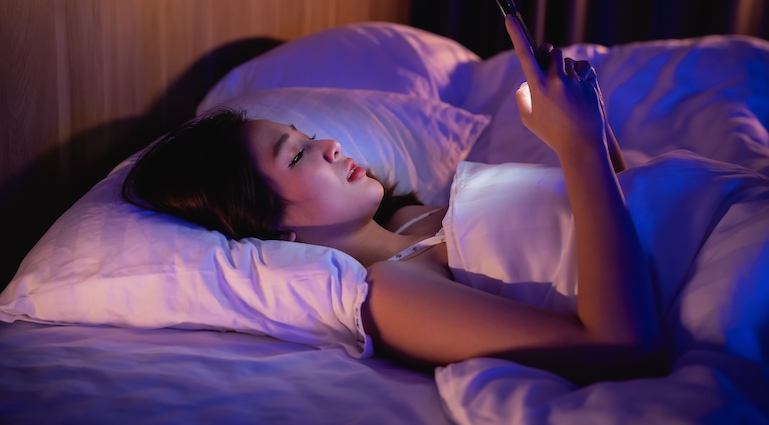Study Finds Bedtime Procrastination Impacts Sleep Quality

Do you find yourself putting things off until the last minute or making excuses for not doing things until you have to? Does this extend to binge-watching a half season of your new favorite show before finally going to sleep? While you’re procrastinating, it’s easy to rationalize why you should be doing anything other than the task at hand, even if that task is falling asleep. Though putting off rest may not seem critical in the moment, a recent study found that bedtime procrastination may harm sleep health.
According to the study, putting off bedtime for leisure activities can shorten sleep time, lower sleep quality, and potentially lead to sleep disorders like insomnia. The study defines procrastination as “delay[ing] bedtime in the absence of external obligations.” So putting off bedtime to complete tasks or work is not considered procrastination, but postponing bedtime with unnecessary activities is.
Researchers performed a 14-day study on 280 undergrad students at a U.S.-based university. Students used daily sleep diaries to record sleep times, time spent asleep compared to total time in bed (efficiency), and the regularity of their sleep schedules. They also noted how restorative their sleep felt and how refreshed they were upon waking. Researchers also used a questionnaire to determine whether or not students had procrastinated before bedtime.
Using the students’ data, the scientists determined that those who admitted procrastinating at night weren’t as efficient with their sleep, slept fewer hours, and woke up less refreshed. The same individuals reported better sleep quality and length when they didn’t procrastinate.
While these poor sleep patterns can lead to issues like insomnia, they aren’t necessarily caused by a sleep disorder. Sleep procrastination is a voluntary action. It’s intentionally putting off sleep to do something else instead and it’s behavioral rather than biological.

Sleep procrastination can be as simple as lying in bed and scrolling on your phone before falling asleep. Even though you’re technically in bed, you’re minimizing your opportunity for sleep. Your internal clock doesn’t procrastinate, and outside obligations will still force you to wake up at the same time, even if you stay up into the wee hours watching dog TikToks.
The study found that sleep health suffered from procrastination no matter the students’ chronotype. Chronotype is the kind of internal clock your body has and the hours you naturally want to be awake and to rest. According to the results, both “night owls” and “early birds” were equally affected by bedtime procrastination.
Though the study found clear evidence to suggest that bedtime procrastination raises the risk of poor sleep health, the researchers acknowledge that there are limitations and further study is needed to better understand the connection. The sample size was fairly small and limited to mostly white female college students. The researchers also echo an older study that notes more objective results could be found using sleep-tracking technology instead of relying on self-reporting.
Luckily, we don’t need to wait for more research to stop procrastinating and start getting better sleep. So, if you’re reading this article while in bed, it might be best to just shut off the screen, close your eyes, and start counting sheep.
Got a hot tip? Pitch us your story idea, share your expertise with SleepFoundation.org, or let us know about your sleep experiences right here.
References
3 Sources
-
Carlson, S. E., Kelly Glazer Baron, Johnson, K. T., & Williams, P. (2023). The thief of (bed)time: Examination of the daily associations between bedtime procrastination and multidimensional sleep health. Sleep Health.
https://www.sleephealthjournal.org/article/S2352-7218(23)00171-7/fulltext -
Hill, V. M., Rebar, A. L., Ferguson, S. A., Shriane, A. E., & Vincent, G. E. (2022). Go to bed! A systematic review and meta-analysis of bedtime procrastination correlates and sleep outcomes. Sleep Medicine Reviews, 66, 101697.
https://www.sciencedirect.com/science/article/abs/pii/S1087079222001101?via%3Dihub -
Kroese, F., De Ridder, D., Evers, C., & Adriaanse, M. (2014, June 18). Bedtime procrastination: introducing a new area of procrastination [Review of Bedtime procrastination: introducing a new area of procrastination]. Frontiers in Psychology.
https://www.frontiersin.org/journals/psychology/articles/10.3389/fpsyg.2014.00611/full












































































